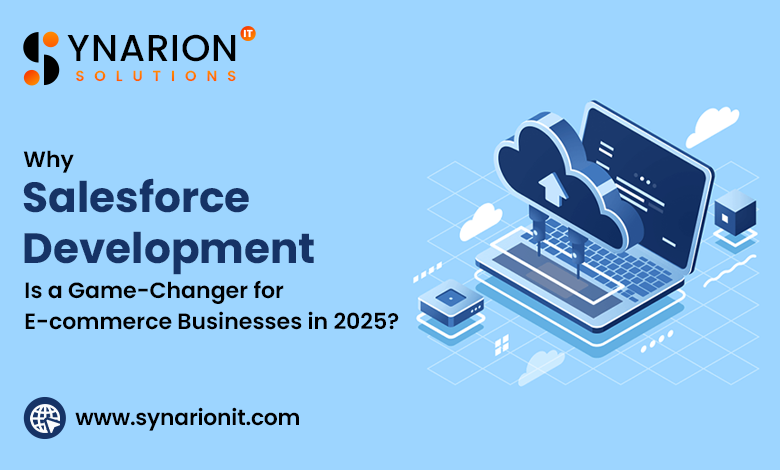In 2025, the e-commerce landscape is more competitive than ever. Businesses are constantly looking for ways to stand out, enhance customer experiences, streamline operations, and boost their bottom lines. One technology that is becoming increasingly essential for e-commerce businesses is Salesforce. As one of the most powerful Customer Relationship Management (CRM) platforms, Salesforce offers a suite of tools that empower e-commerce businesses to manage everything from sales and marketing to customer service and analytics. By leveraging Salesforce Development, e-commerce businesses can transform their operations and gain a competitive edge in a crowded market.
What is Salesforce Development?
Salesforce Development refers to the process of customizing, integrating, and optimizing Salesforce’s cloud-based tools and platforms to meet the unique needs of a business. It involves using various tools within Salesforce, such as Salesforce Sales Cloud, Service Cloud, Marketing Cloud, and Commerce Cloud, to build tailored solutions that align with specific business goals. A Salesforce Development Company specializes in offering these services, enabling businesses to maximize the potential of the Salesforce ecosystem.
Why Salesforce Development Matters for E-commerce in 2025
Enhanced Customer Experience
In the fast-paced world of e-commerce, providing a personalized and seamless customer experience is paramount. Salesforce development enables e-commerce businesses to gain a 360-degree view of their customers. By integrating customer data from various touchpoints—such as websites, social media, email campaigns, and customer service interactions—Salesforce creates a unified customer profile. This enables businesses to deliver highly personalized marketing, sales, and support services, leading to improved customer satisfaction and loyalty.
For example, Salesforce’s AI-powered tool, Einstein, allows businesses to predict customer behavior, recommend products, and automate communications based on individual preferences. By using these insights, e-commerce companies can create tailored marketing strategies that resonate with customers on a personal level, ultimately increasing conversion rates and customer retention.
Streamlined Operations and Automation
One of the key advantages of Salesforce development is the ability to streamline and automate business processes. E-commerce companies often juggle multiple systems for order management, inventory control, customer service, and marketing campaigns. Salesforce integrates all these functions into one unified platform, eliminating the need for disparate systems and reducing manual work.
For example, order processing can be automated, customer inquiries can be handled via AI-powered chatbots, and marketing campaigns can be triggered based on customer behavior. This not only improves operational efficiency but also frees up resources for more strategic tasks, such as expanding product offerings or entering new markets.
Scalability and Flexibility
E-commerce businesses, particularly those that experience rapid growth, need platforms that can scale with them. Salesforce development provides the flexibility to adapt as a business evolves. Whether it’s adding new product lines, entering new geographic markets, or adjusting to seasonal fluctuations in demand, Salesforce’s cloud-based infrastructure allows businesses to scale without worrying about outgrowing their technology.
Additionally, Salesforce integrates easily with other platforms such as ERP systems, third-party logistics providers, and marketing tools. This seamless integration ensures that as an e-commerce business grows, its technology stack remains coherent and aligned with its goals.
Data-Driven Insights and Analytics
In 2025, data is one of the most valuable assets for e-commerce businesses. With Salesforce Development, businesses can tap into advanced analytics and reporting features that provide deep insights into customer behavior, sales performance, and marketing ROI. By analyzing this data, e-commerce businesses can make informed decisions about product offerings, pricing strategies, and customer engagement.
For instance, Salesforce’s reporting tools allow businesses to track sales performance in real-time, analyze customer feedback, and identify areas for improvement. These insights can then be used to refine marketing campaigns, optimize inventory management, and improve overall customer satisfaction.
Omnichannel Integration
The modern consumer interacts with brands across multiple channels—whether that’s through a website, mobile app, social media, or in-store experiences. To stay competitive, e-commerce businesses must provide a seamless experience across all these channels. Salesforce’s omnichannel capabilities allow businesses to integrate various touchpoints into one cohesive customer journey.
With Salesforce, e-commerce businesses can create consistent messaging, personalize customer interactions, and ensure that customers have a seamless experience whether they are browsing on a desktop or interacting with a chatbot on a mobile device. This integration helps increase customer engagement, reduce friction, and ultimately drive sales.
Enhanced Customer Support
Customer service is a critical component of any e-commerce business. In 2025, customers expect fast, efficient, and personalized support. Salesforce’s Service Cloud offers a range of tools to help businesses deliver exceptional customer service. From AI-driven chatbots to automated ticketing systems, Salesforce allows e-commerce companies to resolve customer issues quickly and efficiently.
Moreover, Salesforce’s knowledge management system helps create self-service portals, enabling customers to find solutions to common problems without needing to contact support. By improving customer service, e-commerce businesses can enhance their reputation, build trust, and foster long-term relationships with their customers.
Mobile Optimization
With more consumers shopping on mobile devices, having a mobile-optimized platform is essential for e-commerce success. Salesforce development includes tools for building responsive, mobile-friendly websites and apps, ensuring that customers have a seamless shopping experience across devices. Whether it’s browsing products, making purchases, or receiving customer support, Salesforce helps ensure that mobile users are not left behind in the ever-growing e-commerce market.
Conclusion
As e-commerce continues to evolve in 2025, businesses need advanced, flexible, and scalable solutions to remain competitive. Salesforce development provides a comprehensive suite of tools that enable businesses to enhance customer experiences, streamline operations, gain valuable insights, and scale effectively. Partnering with a trusted Salesforce Development Company can help e-commerce businesses unlock the full potential of this powerful CRM platform, allowing them to stay ahead of the curve and drive long-term success.









